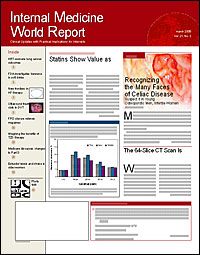Publication
Article
Internal Medicine World Report
Is New-Onset Diabetes with Antihypertensive Therapy a Problem?
Author(s):
Experts Debate the Need for a New Therapeutic Approach
Data showing that diuretics and beta-blockers can increase plasma glucose and are more likely to cause new-onset diabetes (NOD) than the newer antihypertensive agents have led some experts to call for an overhaul of the traditional approach to antihypertensive therapy.
Other experts have looked at the same clinical trial data and come to an antithetical conclusion: current treatment recommendations, particularly involving diuretics, are sound, since there is no evidence from large outcome trials that NOD has any notable effect on mortality or morbidity. The 2 positions were the result of 2 studies published in the February issue of the Journal of Clinical Hypertension.
Yes, Therapy Should Be Changed
"NOD heralds a high risk of ?major CV [cardiovascular] events, which approximates 4%/yr," writes Paolo Verdecchia, MD, and colleagues (J Clin Hypertens. 2006;8:120-126). This "should prompt a judicious use of drugs more frequently associated with NOD, namely diuretics and beta-blockers, in subjects at high risk of diabetes."
A number of antihypertensive therapy studies have shown that both patients who already have diabetes and those who develop NOD are at increased risk for CV events. But the only trial that has found the excess risk associated with NOD to be significant was one that was conducted by the same investigators.
Their study, which had a 16-year follow-up, found a similar risk of CV events among patients who developed NOD and those with diabetes at study entry (Hyper?tension. 2004;43:963-969). This suggested that a longer trial duration is needed to appreciate the true impact of NOD.
In their study, diuretics were taken by 53.5% of patients who developed diabetes compared with 30.4% who did not develop diabetes. The 2 independent predictors of NOD were glucose concentration at baseline and diuretic use at follow-up. In addition, they point to the ARIC (Atherosclerosis Risk in Com?mun?ities) study, in which beta-blockers increased risk of NOD by 25% to 28% compared with no antihypertensive treatment.
Based on these data, they conclude that diuretics and beta-blockers should be used sparingly and at the lowest effective doses in individuals who are at high risk for developing diabetes (eg, due to impaired fasting glucose, overweight, family history of diabetes, decreased high-density lipoprotein cholesterol level).
No, the Data Are Not Convincing
To change current practice, consistent data, including comparative medications and outcome, from well-designed clinical trials are needed, and "at present, the data on new-onset diabetes do not satisfy these criteria," writes Marvin Moser, MD, ?(J Clin Hypertens. 2006;8:126-132). He contends that the effects of diuretics and beta-blockers in clinical trials have little clinical significance, amounting to a 1% to 3.5% increased risk of NOD.
He attributes much of the recent stirrings about the need to reconsider diuretics as initial therapy for hypertension to the single study by Verdecchia et al, which found NOD and pretreatment diabetes conferred similar prognoses. However, he believes there are several potential drawbacks of their study, including:
? There were only 63 CV events among the 795 participants
? Patients were evaluated at baseline, 3 years later, and then >6 years later (What happened in the interim?)
? Patients who developed NOD were high-risk at baseline (higher blood pressure [BP], more left ventricular hypertrophy, higher glucose levels)
? Beta-blockers were not associated with NOD.
Key points
Diuretics and beta-blockers increase susceptibility to NOS.
These drugs also have proven BP-lowering effects.
Alternative agents should ?probably be considered in high-risk patients.
"The results of this study do not settle the question regarding the clinical ?sig?nif?icance of new-onset diabetes," Dr Moser writes, adding that they do, however, ?suggest that drugs such as angiotensin-converting-enzyme inhibitors or angio?tensin receptor blockers may be better choices in high-risk patients.
He points to the SHEP (Systolic Hy?pertension in the Elderly Program) trial, which found that diuretic therapy benefited hypertensive patients, both with and without diabetes, and ?concludes that pending the availability of more consistent or definitive data, "outcomes in diabetic as well as nondiabetic patients will be improved if BP is lowered regardless of the medication used."





